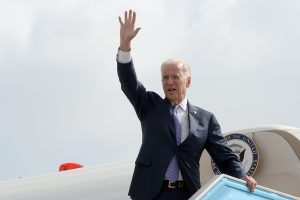The Biden administration has announced its first response to the military coup in Myanmar on February 1, with it what President Joe Biden called the United States’ push for an “immediate return to democracy.”
Biden announced on Wednesday that he had signed an executive order enabling the U.S. to impose sanctions on the military leaders who directed the takeover, as well as their family members and their business interests.
“The military must relinquish power it seized and demonstrate respect for the will of the people of Burma as expressed in their November 8 election,” Biden said. He added that the U.S. will announce the first rounds of sanctions targets this week.
In addition, the U.S. is taking steps to prevent the military leaders of Myanmar from accessing about $1 billion in Burmese funds held in the U.S. by freezing those assets.
The move came a day after the government of New Zealand suspended high-level military and economic contacts with the Myanmar government because of the coup. The country is also imposing a travel ban on its military leaders. “We do not recognize the legitimacy of the military-led government and we call on the military to immediately release all detained political leaders and restore civilian rule,” Foreign Minister Nanaia Mahuta said Tuesday.
Meanwhile, the European foreign ministers are scheduled to meet on February 22 to review the 27 European Union’s relations with Myanmar, and explore ways to apply economic pressure on it.
This was the least that the Biden administration could do given its avowed to commitment to reinforce its avowed commitment to foreground democracy promotion after the four calamitous years of the Trump administration. The sanctions fulfill the aim of sending a message to the new junta that the U.S. government views the military takeover as illegitimate. While the specific scope of the measures remains unclear, they also seem to have been crafted to reduce the collateral impact on the Myanmar public.
Beyond that, their ultimate effect remains a matter of speculation. Tatmadaw Commander-in-Chief Sen. Gen. Min Aung Hlaing, who led the coup, would no doubt have been prepared for such an American response. Min Aung Hlaing has also been on the U.S. Treasury Department’s sanctions list since 2019 due to his role in the ethnic cleansing of the Rohingya, something that apparently did nothing to dissuade him from seizing power.
All this indicates that the military – the senior leadership of which is notoriously insular and solipsistic – will be unlikely to yield to economic pressure from Washington. The Tatmadaw “ran Myanmar for many years under crippling sanctions, will be prepared to do so again,” Richard Horsey, an analyst for the International Crisis Group, wrote on Twitter. “Policymakers must resist urge to impose progressively harsher measures without clearheaded cost-benefit analysis.”
While the sort of blanket sanctions that were imposed on Myanmar in the 1990s seem unlikely, even targeted sanctions highlight a problem that I have identified before: the growing difficulty that the U.S. faces of seeking to counter Chinese influence in Southeast Asia, while also promoting democratic norms, something that often creates frictions with the region’s governments.
Values and interests are not always opposed, of course; but nor do they always align. The case of Myanmar is particularly tricky. The nation shares a 2,000-kilometer border with China and is increasingly economically entwined with it. It also relies on Beijing’s support to help broker ceasefires and peace deals with armed rebel groups with which the Chinese government has long and enduring ties. It has a great need for the transport and communications infrastructure that China is able and willing to build.
All of these things pertain regardless of who is in power in Naypyidaw, and whether they have been elected in free and fair elections. As my colleague Shannon Tiezzi has noted, the coup has likely created some headaches in Beijing, but Chinese leaders will be flexible in coming to grips with the new constellations of power in Naypyidaw.
More broadly, it’s unclear how relevant Western “democracy promotion” efforts are in the context of Myanmar. As I’ve noted at length elsewhere, a lack of democracy is far from being the country’s only problem, or even its most pressing one. Before a state can be genuinely democratic, there needs to be a broad consensus on the scope and nature of the state itself – and this question has been contested continually since the country’s independence in 1948.
The peril of sanctions, aside from their human impact, is that they will alienate the junta from the U.S. government and reduce the latter’s ability to have much say in how Myanmar seeks to handle these deeply-rooted challenges, under whichever system of government.
Van Tran of Cornell University put it well in an article this week: “The West will likely fail to reverse the current political trends through sanctions and will only diminish its importance and create a vacuum to be filled by Myanmar’s willing economic partners.”

































